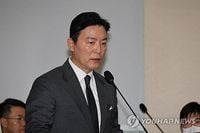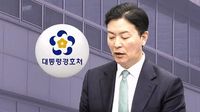On April 15, 2025, Kim Seong-ho, the head of the Presidential Security Service (PSS), announced his intention to resign during a meeting with PSS staff. The announcement comes amidst unprecedented protests from PSS employees demanding his resignation alongside that of Deputy Director Lee Gwang-woo. This collective action marks the first time in the 62-year history of the PSS that such a formal statement has been issued against its leadership.
Kim's resignation follows a statement circulated by PSS staff on April 10, which criticized both him and Lee for allegedly prioritizing their loyalty to former President Yoon Suk-yeol over their duties. The statement accused them of turning the PSS into a private organization for the President and engaging in misconduct, including abuse of power. Approximately 700 PSS employees participated in the protest, with reports indicating that around 80% of the staff signed the statement.
During the meeting, Kim expressed his intention to step down by the end of April and stated he would refrain from interfering with official duties for the remainder of his term. However, it remains unclear whether his resignation has been officially accepted.
The protests come in the wake of Yoon's impeachment, which has exposed deep internal conflicts within the PSS. Following the impeachment, many staff members were unsettled by Kim and Lee's continued presence in their roles. The statement from the protesting staff further emphasized that Kim and Lee's actions had jeopardized the organization, leading to a crisis of confidence among the ranks.
As the situation unfolded, it was reported that Kim and Lee are currently under investigation by police and the Corruption Investigation Office for High-ranking Officials (CIO) for their alleged involvement in obstructing a security briefing related to Yoon's first arrest warrant on January 3, 2025. They are also accused of retaliating against PSS staff who refused to comply with orders to obstruct the briefing and of deleting communication records from the presidential office's secure phone system.
The PSS staff's actions reflect a significant shift in the dynamics of the organization. Historically, the PSS has maintained a strict hierarchy with little room for dissent. However, the demand for leadership change indicates a growing discontent among employees regarding the agency's direction and leadership.
Lee Gwang-woo, who is also facing calls for resignation, is currently on extended leave until April 25, 2025. He has not yet indicated whether he plans to resign. The protests within the PSS have raised questions about the future of the agency and its leadership, as well as the implications for ongoing investigations into the actions of Kim and Lee.
Political observers have noted that the resignation of Kim could lead to further scrutiny of the PSS, particularly regarding its handling of sensitive information and its role in protecting the President. Following Kim's announcement, Lee Ji-hye, a spokesperson for the Democratic Party, criticized the resignation as a 'black comedy,' suggesting that it does not absolve Kim from facing legal consequences.
As the PSS navigates this unprecedented crisis, the potential for further investigations into its operations looms large. With Kim's resignation, the police may attempt to search the PSS's secure phone server, which was previously blocked by Kim under the justification of protecting military secrets and official confidentiality. The implications of this situation extend beyond the immediate leadership crisis, as they could influence the broader political landscape in South Korea.
The internal conflict within the PSS highlights the challenges facing security agencies in maintaining integrity and public trust, especially in the wake of political upheaval. As the situation continues to develop, all eyes will be on the PSS and its leadership to see how they respond to the demands of their staff and the ongoing investigations.
In a historical context, the PSS was established to ensure the safety of the President and the integrity of the office. However, recent events have raised critical questions about its effectiveness and accountability. The protests signify a turning point for the agency, as staff members seek to reclaim their agency and restore faith in their leadership.
The PSS's future remains uncertain, but the demand for accountability and transparency is clear. As public scrutiny intensifies, the agency will need to address the concerns raised by its staff and the implications of Kim and Lee's actions. This situation serves as a reminder of the importance of ethical leadership and the need for security agencies to operate with integrity and in the best interest of the public they serve.
![[속보] 김성훈 경호차장 “4월 말 사퇴”…초유의 연판장에 백기](https://thumbor.evrimagaci.org/dKKRj6LxN89GfOM0Pt8Dz-lrQZ8=/200x0/tpg%2Fsources%2F160c0c22-8a54-482d-ad19-7849c89b33fc.jpeg)


![[속보] 김성훈 경호차장 “사퇴하겠다”···직원들 연판장에 백기](https://thumbor.evrimagaci.org/wayy-5fFMXvV4pIX5OWp5YdN_qk=/200x0/tpg%2Fsources%2Fad68538a-35ab-4e11-8726-d32ff7d96beb.jpeg)




